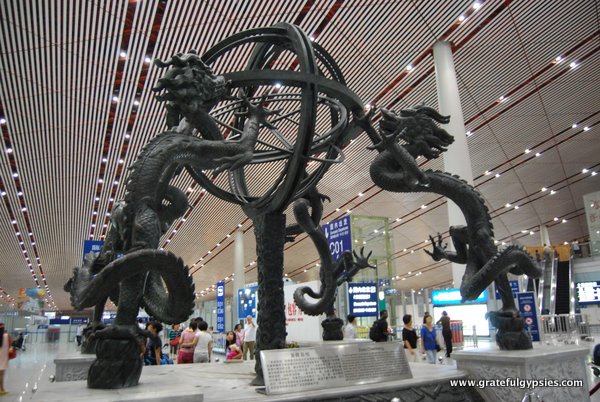Chinese Lesson – After the Flight Posted by sasha on May 10, 2017 in Vocabulary
It’s been a long trip so far using Chinese for air travel. Hopefully you had a nice flight and made it to your destination on time. In this final lesson, we’ll find connecting flights, pick up our bags, and catch a cab or public transportation to the hotel.
Connecting Flight
If you didn’t book a direct trip, you’ll have to find your connecting flight (转机航班 – zhuǎn jī háng bān). Follow the same steps you took for your original flight – check the timetable, find your gate, and wait for the boarding announcement. If your flight arrived late – which tends to happen very often in China – you might have to go to the gate and tell them:
我错过了转机航班
wǒ cuò guò le zhuǎn jī háng bān
I’ve missed my connecting flight.
Let’s hope they put you on another flight sooner than later. You might want to go ahead and buy a snack (小吃 – xiǎo chī) and a magazine (杂志 – zá zhì) while you wait.
Baggage Claim
Those who are fortunate enough to not have to deal with connecting flights can go ahead and follow the signs to baggage claim (行李认领 – xíng li rèn lǐng). Find the carousel for your flight and grab your bag off the conveyor belt (传送带 – chuán sòng dài). If your bags are heavy, never fear – most airports in China have free baggage carts (行李车 – xíng lǐ chē). At some airports you’ll even find porters (行李员 – xíng lǐ yuán) who will help carry your bags for a small fee. Of course, there’s always the slight chance that your baggage could have been damaged or lost. Hopefully you don’t have to use these phrases, but you might want to have them ready just in case:
我的行李被损坏了
wǒ de xíng lǐ bèi sǔn huài le
My luggage was damaged.
我的行李丢了
wǒ de xíng lǐ diū le
My luggage was lost.
I just hope you don’t have as bad of an experience as I did flying from Kuala Lumpur to Shanghai last year. After a 5-hour delay where we had to sleep on two chairs pushed together, we finally arrived in Shanghai to find our bags soaking wet and reeking of dead fish!
Ground Transport
After that long trip, you just want to get to your hotel, take a shower, and relax. Not so fast! You still have to navigate the options for ground transport. In most Chinese airports, black cab (黑车 – hēi chē) drivers lurk around arrival halls looking for customers. Simply brush them off with a “Don’t need, thanks” (不用, 谢谢 – bù yòng, xiè xiè) and keep walking. At the very least, they’ll rip you off with a fare that’s double what it should be. Instead, find the official taxi stand (出租车候客处 – chū zū chē hòu kè chù). Don’t assume that a taxi driver will know your accommodation by name. It’s best to have the address so you can give it to them and say:
请带我去这个地址
qǐng dài wǒ qù zhè ge dì zhǐ
Please take me to this address.
Many cities in China also have an airport shuttle bus (机场摆渡车 – jī chǎng bǎi dù chē) which will bring you to a central location downtown. If you’re looking to save a bit of money, this is a good option. In the bigger cities, you can always just hop on the subway (地铁 – dì tiě). For example, in Beijing you can take the airport express (机场快轨 – jī chǎng kuài guǐ) straight to Sanyuanqiao or Dongzhimen.
Once you’ve made it to your hotel (酒店 – jiǔ diàn), you can breathe a sigh of relief – you successfully flew in Chinese! From booking your flight all the way to catching that cab, you had to use new words and communicate your needs and wants in Chinese. A whole new adventure is just beginning, as you get ready to check-in to your hotel. We’ll leave that for another series, though!

Build vocabulary, practice pronunciation, and more with Transparent Language Online. Available anytime, anywhere, on any device.






Leave a comment: